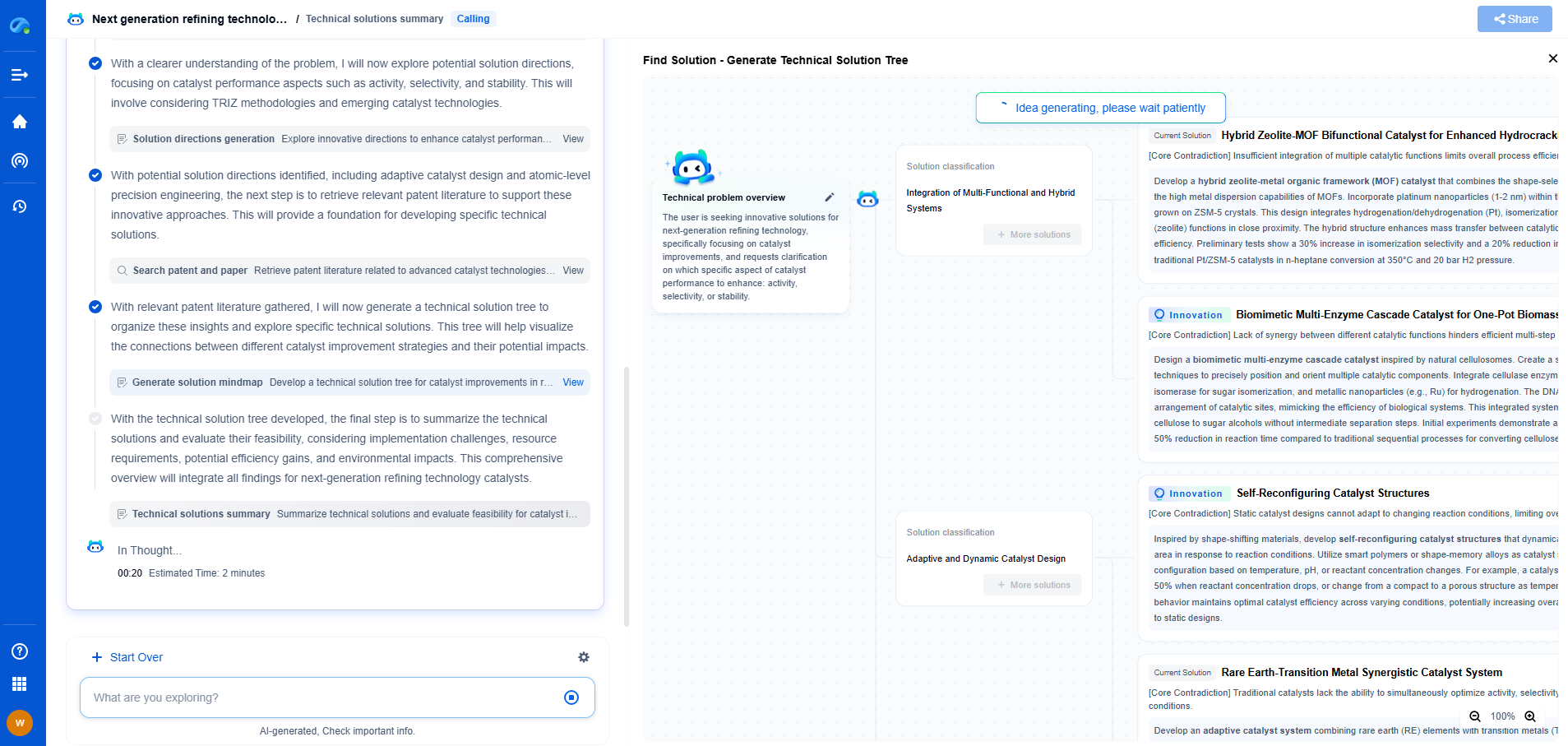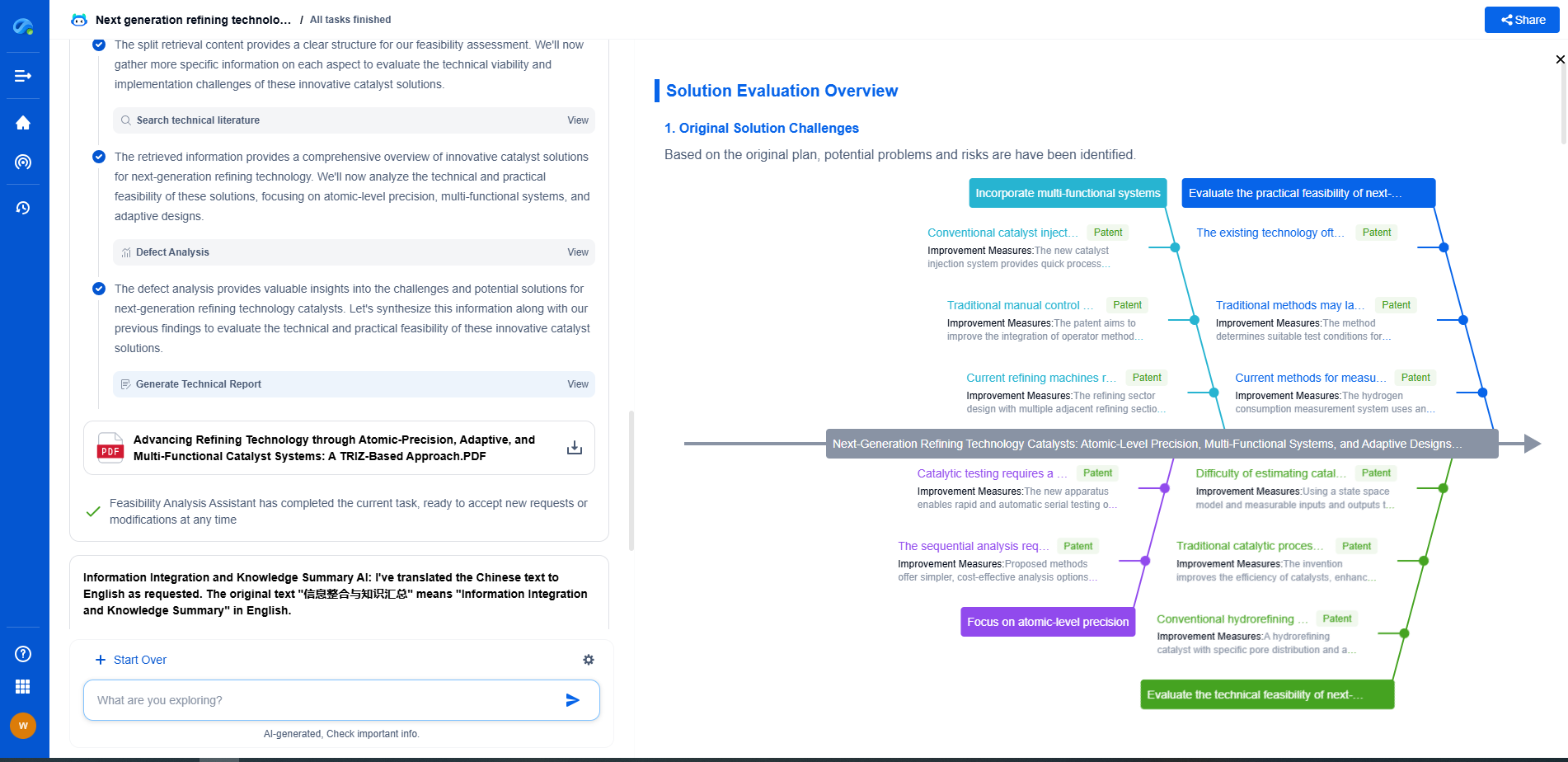The Future of Intelligent Control Systems: From Rule-Based to Data-Driven
JUL 2, 2025 |
The realm of intelligent control systems has undergone a remarkable transformation over the past few decades. Traditionally, these systems were rule-based, relying heavily on predefined directives and logic. However, with advancements in data science and machine learning, there has been a significant shift towards data-driven approaches. This evolution is redefining how control systems operate, making them more adaptive, efficient, and capable of handling complex scenarios.
The Limitations of Rule-Based Systems
Rule-based systems have been the backbone of control systems for many years. These systems are built on a set of predefined rules and logic, which makes them predictable and easy to understand. However, they come with inherent limitations. The primary drawback is their rigidity. As environments and requirements change, rule-based systems often struggle to adapt unless manually reprogrammed. This rigidity can lead to inefficiencies and errors, especially in dynamic and unpredictable situations.
Moreover, rule-based systems require extensive domain knowledge to develop accurate rules. This process is time-consuming and often leads to oversimplified models that cannot capture the complexities of real-world scenarios. Consequently, these systems are becoming less viable in an era where adaptability and real-time decision-making are crucial.
The Rise of Data-Driven Systems
Data-driven approaches have emerged as a powerful alternative, leveraging the vast amounts of data generated by modern systems. Unlike rule-based systems, data-driven models use machine learning algorithms to learn from data. This allows them to identify patterns, make predictions, and adapt to new situations without explicit programming.
One of the most significant advantages of data-driven systems is their ability to continuously improve. As more data becomes available, these systems refine their models, leading to increased accuracy and efficiency over time. This adaptability makes them particularly valuable in industries where conditions change rapidly, such as finance, healthcare, and autonomous vehicles.
Machine Learning and Neural Networks
At the heart of data-driven control systems are machine learning techniques and neural networks. These technologies enable systems to process and analyze large volumes of data, extracting meaningful insights that drive decision-making. Neural networks, in particular, have shown remarkable success in modeling complex relationships and predicting outcomes in various applications.
Deep learning, a subset of machine learning, is playing an instrumental role in advancing intelligent control systems. It allows for the development of highly sophisticated models that can understand intricate patterns and features hidden within data. As a result, deep learning has been pivotal in pushing the boundaries of what is possible with intelligent control systems.
Applications and Impact
The impact of data-driven control systems is far-reaching, with applications spanning numerous industries. In manufacturing, these systems optimize production processes, reduce waste, and improve quality control. In healthcare, they contribute to precision medicine by analyzing patient data to predict health outcomes and recommend personalized treatments.
In the automotive industry, data-driven control systems are revolutionizing autonomous driving. These systems interpret data from various sensors to make real-time decisions, ensuring safe and efficient navigation. Similarly, in finance, they are used for algorithmic trading, risk management, and fraud detection, providing faster and more accurate insights than traditional methods.
Challenges and Considerations
Despite their advantages, data-driven systems are not without challenges. One major concern is the reliance on large amounts of data for training models. Ensuring data quality and availability is crucial, as poor-quality data can lead to inaccurate predictions and outcomes. Additionally, these systems often function as black boxes, making it challenging to interpret their decision-making processes.
Ethical considerations also come into play, particularly in sensitive applications like healthcare and finance. Ensuring transparency, fairness, and accountability in data-driven systems is essential to maintain trust and prevent biases.
Conclusion and Future Outlook
The transition from rule-based to data-driven control systems marks a significant milestone in the evolution of intelligent systems. As data continues to grow in volume and complexity, the potential for these systems will expand even further. Future advancements in artificial intelligence, computational power, and data analytics promise to enhance the capabilities of data-driven control systems, making them more robust, adaptable, and intelligent.
In conclusion, the future of intelligent control systems is undeniably data-driven. This shift is poised to transform industries, improve efficiency, and offer unprecedented levels of customization and precision. As we embrace this new era, it is crucial to address the challenges and ethical considerations that come with it, ensuring that the benefits of these technologies are realized responsibly and equitably.
Ready to Reinvent How You Work on Control Systems?
Designing, analyzing, and optimizing control systems involves complex decision-making, from selecting the right sensor configurations to ensuring robust fault tolerance and interoperability. If you’re spending countless hours digging through documentation, standards, patents, or simulation results — it's time for a smarter way to work.
Patsnap Eureka is your intelligent AI Agent, purpose-built for R&D and IP professionals in high-tech industries. Whether you're developing next-gen motion controllers, debugging signal integrity issues, or navigating complex regulatory and patent landscapes in industrial automation, Eureka helps you cut through technical noise and surface the insights that matter—faster.
👉 Experience Patsnap Eureka today — Power up your Control Systems innovation with AI intelligence built for engineers and IP minds.
- R&D
- Intellectual Property
- Life Sciences
- Materials
- Tech Scout
- Unparalleled Data Quality
- Higher Quality Content
- 60% Fewer Hallucinations
Browse by: Latest US Patents, China's latest patents, Technical Efficacy Thesaurus, Application Domain, Technology Topic, Popular Technical Reports.
© 2025 PatSnap. All rights reserved.Legal|Privacy policy|Modern Slavery Act Transparency Statement|Sitemap|About US| Contact US: help@patsnap.com

